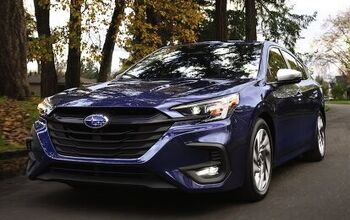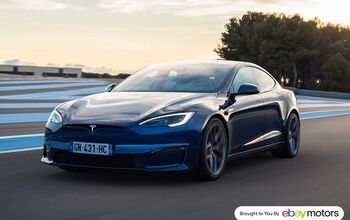It's Official: The Nissan Quest Is Dead, Discontinued, Defunct, Cancelled
“The Nissan Quest has been discontinued for the U.S. marketplace.”
TTAC has been tracking the Nissan Quest’s failure in the U.S. marketplace for some time. Just ahead of Christmas last year, when it appeared as though the Quest was surely dead in the water, Nissan confirmed that there would in fact be a 2017 Quest.
But when tipped off by an industry insider last February, we noticed that Nissan was reporting higher-than-normal Quest sales despite lacking any meaningful inventory. That’s right — the 2017 Nissan Quest was essentially a fleet-only vehicle.
Most of us stopped tracking the story. After all, it’s a minivan, and a long-ignored minivan, in a market where buyers are currently turning away from minivan in droves. TTAC’s Corey Lewis didn’t quit, however. Like a dog with a bone, Corey discovered that the Quest was missing from NissanUSA.com. Under the Minivans & Vans section, there’s no minivan. We asked Nissan, not for the first time, whether the Quest is dead.
The Nissan Quest is dead. Gone. Expired. Terminated.
If you want one, a handful remain on dealer lots. Cars.com’s inventory includes 41 new Nissan Quests, 25 of which are 2016 models; none of which are 2017s.
But more likely than not, you don’t want. The Quest, particularly since IIHS small overlap crash tests revealed frightening results, simply isn’t that appealing in a segment dominated by FCA, Toyota, and Honda. Even in 2012, the fourth-generation Quest’s best year, only 3 percent of the minivans sold in America were Nissans. When overall minivan volume fell 4 percent the next year, Quest sales plunged 30 percent to only 12,874 units.
Nissan has only reported 79,349 Quest sales since the fourth-gen model arrived in 2011. That’s about the number of Grand Caravans Dodge sells every seven months.
Besides the obvious — the Quest’s lack of popularity — we asked Nissan to clarify why the automaker quit America’s minivan game. Other than clarifying that the Quest was definitely discontinued, Nissan declined to comment further.
Nissan won’t be giving up on the van game entirely. Through the first one-third of 2017, 8.5 percent of the commercial vans sold in America were Nissans: 5,990 full-size NVs and 6,192 small NV200s. The NV is a bit player in the full-size commercial van arena; the NV200 is America’s second-best-selling small commercial van.
Timothy Cain is the founder of GoodCarBadCar.net, which obsesses over the free and frequent publication of U.S. and Canadian auto sales figures. Follow on Twitter @timcaincars.
More by Timothy Cain
Latest Car Reviews
Read moreLatest Product Reviews
Read moreRecent Comments
- Jalop1991 In a manner similar to PHEV being the correct answer, I declare RPVs to be the correct answer here.We're doing it with certain aircraft; why not with cars on the ground, using hardware and tools like Telsa's "FSD" or GM's "SuperCruise" as the base?Take the local Uber driver out of the car, and put him in a professional centralized environment from where he drives me around. The system and the individual car can have awareness as well as gates, but he's responsible for the driving.Put the tech into my car, and let me buy it as needed. I need someone else to drive me home; hit the button and voila, I've hired a driver for the moment. I don't want to drive 11 hours to my vacation spot; hire the remote pilot for that. When I get there, I have my car and he's still at his normal location, piloting cars for other people.The system would allow for driver rest period, like what's required for truckers, so I might end up with multiple people driving me to the coast. I don't care. And they don't have to be physically with me, therefore they can be way cheaper.Charge taxi-type per-mile rates. For long drives, offer per-trip rates. Offer subscriptions, including miles/hours. Whatever.(And for grins, dress the remote pilots all as Johnnie.)Start this out with big rigs. Take the trucker away from the long haul driving, and let him be there for emergencies and the short haul parts of the trip.And in a manner similar to PHEVs being discredited, I fully expect to be razzed for this brilliant idea (not unlike how Alan Kay wasn't recognized until many many years later for his Dynabook vision).
- B-BodyBuick84 Not afraid of AV's as I highly doubt they will ever be %100 viable for our roads. Stop-and-go downtown city or rush hour highway traffic? I can see that, but otherwise there's simply too many variables. Bad weather conditions, faded road lines or markings, reflective surfaces with glare, etc. There's also the issue of cultural norms. About a decade ago there was actually an online test called 'The Morality Machine' one could do online where you were in control of an AV and choose what action to take when a crash was inevitable. I think something like 2.5 million people across the world participated? For example, do you hit and most likely kill the elderly couple strolling across the crosswalk or crash the vehicle into a cement barrier and almost certainly cause the death of the vehicle occupants? What if it's a parent and child? In N. America 98% of people choose to hit the elderly couple and save themselves while in Asia, the exact opposite happened where 98% choose to hit the parent and child. Why? Cultural differences. Asia puts a lot of emphasis on respecting their elderly while N. America has a culture of 'save/ protect the children'. Are these AV's going to respect that culture? Is a VW Jetta or Buick Envision AV going to have different programming depending on whether it's sold in Canada or Taiwan? how's that going to effect legislation and legal battles when a crash inevitibly does happen? These are the true barriers to mass AV adoption, and in the 10 years since that test came out, there has been zero answers or progress on this matter. So no, I'm not afraid of AV's simply because with the exception of a few specific situations, most avenues are going to prove to be a dead-end for automakers.
- Mike Bradley Autonomous cars were developed in Silicon Valley. For new products there, the standard business plan is to put a barely-functioning product on the market right away and wait for the early-adopter customers to find the flaws. That's exactly what's happened. Detroit's plan is pretty much the opposite, but Detroit isn't developing this product. That's why dealers, for instance, haven't been trained in the cars.
- Dartman https://apnews.com/article/artificial-intelligence-fighter-jets-air-force-6a1100c96a73ca9b7f41cbd6a2753fdaAutonomous/Ai is here now. The question is implementation and acceptance.
- FreedMike If Dodge were smart - and I don't think they are - they'd spend their money refreshing and reworking the Durango (which I think is entering model year 3,221), versus going down the same "stuff 'em full of motor and give 'em cool new paint options" path. That's the approach they used with the Charger and Challenger, and both those models are dead. The Durango is still a strong product in a strong market; why not keep it fresher?


































Comments
Join the conversation
My wife and I transport our family of 5 in our '11 Quest SV and love it. It doesn't have that boring look like the Sienna and it doesn't suffer from having to see yourself coming and going 5 times a day like you do in the Odyssey. Sure, they sell more, but drive a Quest and you'll NEVER bother with an FCA. Seriously? Around these parts an FCA van driver is either over 75 years old or WT, that's stigma for ya... We are sitting at 172k on ours and after installing a new CVT at 165k we still love it. The covered cargo hold is perfect and the AC and cabin comfort is better than the Sienna and 3rd row headroom in the Odyssey is a big negative. And the 3.5 with 260hp goes to 6k on full accel and you are at 85mph in a flash. We are going to find an off lease '16 soon and make that a stablemate to our '11.
"Quest" is too good a name to drop forever. I hope they have the sense to re-introduce it after a decent interval, when everyone has forgotten the van. They might have to change it slightly - call it the Re-Quest or something.